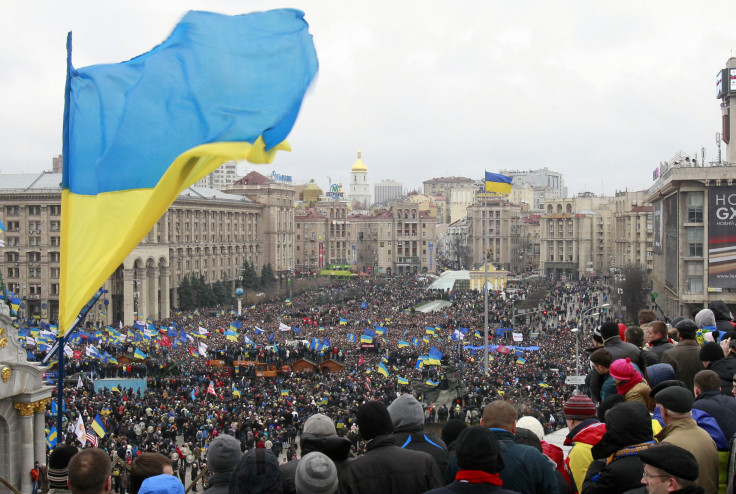Ukraine’s Relationship With Russia: What’s At Stake In Tug Of War Between The EU And Russia

Ukraine is caught between a rock and a hard place, with vast popular support for a trading alliance with the European Union on the one hand but strong economic arm-twisting from the Kremlin on the other if it proceeds with such an alliance.
Russian President Vladimir Putin has made clear that the nation of 44 million, at one time known as the breadbasket of the former Soviet Union, could lose cheap natural gas, a quarter of its economic exports and 400,000 jobs if it aligns with the European Union for trade purposes, according to reports.
On the other hand, failure to align itself in terms of trade with the EU could worsen already violent street protests that erupted after Ukraine's current government put off signing an association agreement on Friday. Bloomberg News reports the protests are the largest since the nation's 2004 Orange Revolution.
Last week's decision not to sign the association was a U-turn for Ukraine's government.
A free trade deal with the EU has been a longtime goal of Ukrainian President Victor Yanukovich.
A Nov. 27 bulletin from the Ukraine Cabinet notes that EU-Ukraine trade has grown fivefold over the past 16 years, whereas trade with Russia’s economic bloc grew by significantly less than that.
Putin is not just using a stick to get his way; he is offering various carrots, too. He is tempting Ukraine with promises of cheaper natural gas if the country joins a Moscow-led economic bloc and stops free trade discussions with the EU. Benefits like that could help cut Ukraine’s trade deficit by reducing energy costs.
Even though Ukraine suspended free trade talks with the EU, the nation's government said it should know sometime in December whether it will finalize the deal with the EU sometime in the spring of 2014.
EU officials have condemned the pressure from Russia on these talks, with European Commission President Jose Barroso criticizing the pressure as an unacceptable “veto,” reported the BBC.
The EU even published results from a phone call between Barroso and Yanukovich on Monday, where it warned Yanukovich not to use excessive police force to handle protests. Other EU officials have already condemned police use of force. Protestors have been estimated at half a million strong in Ukraine’s capital Kiev, and police clashes have left at least 260 people injured.
If protests continue, Ukraine’s economy could lose $500 million in gross domestic product per day, the official UKrinform news agency quoted an economist as saying on Monday.
Foreign debt held by Ukrainian private companies, estimated at more than $100 billion, could be hard to refinance in such a tense environment. Foreign direct investment could also slow.
“A prolonged period of political instability is the last thing Ukraine’s struggling economy needs,” a note from London’s Capital Economics said on Monday. Its economists cite Ukraine’s ongoing recession, noting recent slumps in construction and exports.
The country is also struggling with a trade deficit worth 8 percent of GDP and low foreign currency reserves.
“International financial markets have been essentially closed for Ukraine’s government over the past few months, forcing it to use FX [foreign exchange] reserves to repay external debt,” wrote Capital Economics’ emerging markets economist Liza Ermolenko.
Ukraine exports iron, steel, agricultural products and machinery to the EU, while it receives chemicals and machinery from the bloc. Trade between the two totaled 38.3 billion euros ($51.8 billion) in 2012.
Russia, however, supplies the Ukraine with about 60 percent of its natural gas. Ukrainian Prime Minister Mykola Azarov said in parliament on Nov. 27 that losing free trade with the Russian-led customs and economic bloc could cost the Ukraine 400,000 jobs.
Ukraine also exported $17.6 billion in goods to Russia in 2012, or a quarter of its total exports, government ministers noted. Russian officials help set the price of natural gas sold to Ukraine, in complex diplomatic talks, and have said Ukraine’s willingness to join its trade union is a key factor in energy prices. Armenia opted for cheaper natural gas and Russia’s trade bloc instead of an EU deal in September.
Top European leaders like German Chancellor Angela Merkel have been especially irked by Russia’s strong-arm diplomacy on the Ukrainian front. Ukraine should be able to “decide freely” between Russia and the EU, she told reporters in Berlin on Nov. 27. “The Cold War is over,” she noted.
© Copyright IBTimes 2024. All rights reserved.




















